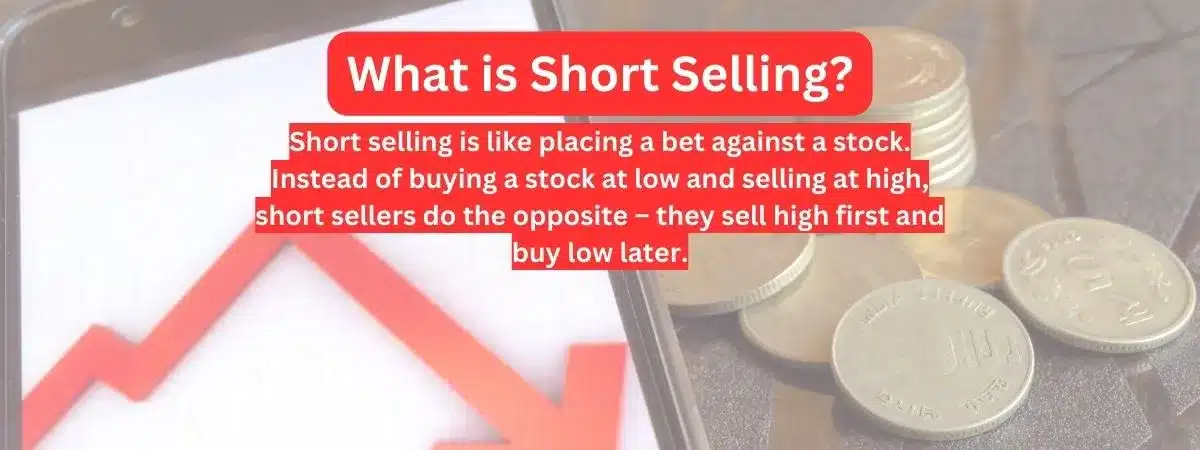Short selling is a unique strategy of stock trading that allows traders to profit even when stock prices are falling.
While it may sound a bit complex, this article aims to break down the basics of short selling in simple terms, helping you understand how it works and how you can potentially benefit from declining stock prices.
What is Short Selling?
Short selling is like placing a bet against a stock with the thought that the price will fall.
Instead of buying a stock at low and selling at high, short sellers do the opposite – they sell high first and buy low later.

Here’s a step-by-step process breakdown:
Short sellers borrow shares from a broker, promising to return them later. They sell these borrowed shares on the market at the current high price.
Waiting for a Decline:
After selling, short sellers wait for the stock price to drop. This is where they can make a profit.
Buying Back at a Lower Price:
Once the stock’s price has fallen, short sellers buy back the same number of shares they borrowed at the lower price.
The final step is returning the borrowed shares to the broker. The difference between the high selling price and the low buying price is the short seller’s profit.
Why Consider Short Selling?
Short selling isn’t for everyone, but it can be useful for traders looking to diversify their strategies.
Here are a few reasons why some traders turn to short selling:
Profiting in a Bear Market:
Short selling allows traders to make money while traditional strategies may struggle in a bear market where stock prices are falling.
Hedging Against Losses:
Short selling can act as a hedge, helping investors offset losses in their portfolio when the overall market is in a declining phase.
Taking Advantage of Overvalued Stocks:
Short sellers often target stocks they believe are overvalued, betting that the market will eventually recognize this and the stock price will drop.
Advantages of Short Selling:
Profit in a Bear Market:
Short selling allows traders to profit from falling stock prices, providing a strategy to make money during bear markets or economic downturns.
Portfolio Diversification:
Short selling offers a way to diversify an investment portfolio. While traditional strategies focus on buying and holding stocks, short selling enables investors to benefit from both rising and falling markets.
Hedging Against Losses:
Short selling can act as a hedge against losses in a long portfolio. By betting against certain stocks, investors can offset potential declines in the overall market.
Capitalizing on Overvalued Stocks:
Short sellers often target stocks they believe are overvalued. This strategy allows them to capitalize on corrections in stock prices and take advantage of market inefficiencies.
Disadvantages of Short Selling:
Unlimited Losses:
Unlike buying stocks, where losses are capped at the initial investment, short selling carries the risk of unlimited losses.
If a short stock’s price keeps rising, the potential losses for the short seller are theoretically limitless.
Timing Challenges:
Successful short selling requires precise timing. Predicting when a stock will decline is inherently challenging, and mistimed trades can result in significant losses.
Interest and Dividend Costs:
Short sellers may incur costs in the form of interest on the borrowed shares and may be required to pay dividends to the owner of the borrowed shares. These additional costs can impact potential profits.
Market Volatility:
Short selling can contribute to market volatility, especially during periods of economic uncertainty.
Rapid and large-scale short covering (buying back borrowed shares) can lead to sharp upward price movements.
Regulatory Risks:
Regulatory changes or interventions can impact short-selling rules. Governments and regulatory bodies may implement restrictions or ban short selling in certain circumstances to stabilize markets.
Bottom Line:
Short selling is a unique strategy that allows traders to profit from falling stock prices. While it comes with risks and challenges, understanding the basics can empower you to make informed investment decisions.
FAQs:
How does short selling work?
It is a trading strategy where a trader borrows shares of stock from a broker and sells them on the market at the current high price.
Then he waits for the stock price to decline before buying back the same number of shares at a lower price.
The borrowed shares are returned to the broker, and the difference between the selling and buying prices represents the investor’s profit.
What is an example of short selling?
Let’s say Investor ‘A’ believes Company XYZ’s stock is overvalued at Rs. 50 per share. They borrow 100 shares from their broker and sell them on the market, generating Rs. 5,000 (Rs. 50 per share * 100 shares).
If the stock price drops to Rs. 40 per share, Investor ‘A’ buys back 100 shares for Rs. 4,000, returning them to the broker. The profit is Rs. 1,000 (Rs. 5,000 initial sale – Rs. 4,000 repurchase).
Is short selling legal in India?
Yes, short selling is legal in India. The Securities and Exchange Board of India (SEBI) regulates securities markets in the country and has established guidelines and regulations for short selling to ensure fair and transparent practices.
Can you short-sell a stock you own?
No, you cannot short-sell a stock you already own. Short selling involves borrowing shares to sell, and you cannot borrow shares of a stock you already possess.
Can you short-sell after-hours?
In many markets, short selling after-hours is restricted. Trading hours for short selling usually align with regular market hours.
Can you short-sell any stock?
While many stocks are eligible for short selling, some may be restricted or face higher borrowing costs. It depends on market conditions and regulations.
Can you short-sell a bond?
Short-selling bonds are less common than stocks. Bond markets may have different rules and procedures for short selling.
Can you short-sell a mutual fund?
Generally, mutual funds cannot be directly short-sold. Short selling is more common with individual stocks and certain ETFs.
Can short selling be done in CNC?
No, short selling typically involves using the product type MIS (Margin Intraday Square-off) and not CNC (Cash and Carry).
Can a short sell be done in the delivery?
No, short selling is usually done through intraday or margin trading accounts and not in delivery-based transactions.
Can short sell be carried forward?
Yes, while trading in the F&O segment, short positions can be carried forward.
Can you short-sell Bitcoin?
Yes, short selling of Bitcoin and other cryptocurrencies is possible on certain platforms that offer margin trading.
Can you short-sell currency?
Yes, short selling of currency pairs is common in the foreign exchange (forex) market.
Can short-sell be converted to delivery?
No, short-sell positions are generally closed by buying back the borrowed shares. They cannot be automatically converted to delivery.
Can short sellers destroy a company?
While short selling can impact stock prices, it’s unlikely to single-handedly destroy a company. Market dynamics involve various factors.
Do short sellers pay dividends?
Yes, short sellers are often responsible for paying any dividends declared by the companies whose shares they have shorted.
Can we short-sell ETFs in India?
Yes, short selling of ETFs (Exchange-Traded Funds) is allowed in the Indian market.
Can we short-sell for the long term?
Short selling is typically a short- to medium-term strategy. It may not be suitable for long-term investment goals.
Can we short-sell in swing trading in India?
Yes, short selling can be part of swing trading strategies in the Indian market. But it is only possible in future and option contracts.
Can you short-sell penny stocks?
Yes, short-selling penny stocks is possible, but it may involve higher risks due to their volatile nature.



